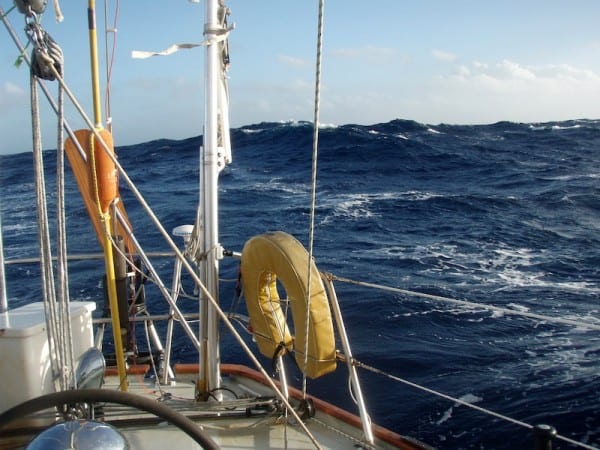Everyone has a different theory about seasickness, but they all agree it’s a disaster. Slight nausea can be overcome with some fresh air, bland food, and a concentrated stare at the horizon. It might mean that someone else has to take your turn at the galley that day. But severe seasickness is a disater for everyone aboard, not least the sufferer.
. . . sign up to the right to get immediate access to this full post,
plus you'll get 10 of our best videos for free.
Get Free Videos& Learn More Join Now!!for Full Access Members Sign In



Mike Wolter says:
Going out as a child on my fathers boat during the weekend regatta’s held at the local yacht club I had developed a deep animosity towards boats, sailing and the ocean in general. It would have not been so bad if able to enjoy the ride without the excruciating headaches along with the nausea that accompanied it. Being incredibly anxious at that age didn’t help either. Fast forward 30 years later it became peculiar that this interest in boats and ships would materialize along with an interest for sailing and maritime careers. But, let us not forget the elephant in the room, i.e the dreaded ‘sea sickness’. The questions were then asked.
‘What is the reason combination of reasons for this affliction?
Are some people more prone than others?
What are a few preventative measures?
Is it possible to eventually adapt?
All of these questions. It was comforting knowing that even the most saltiest of sailors have been seasick at some point or other and that it can be mitigated. The thing that has been most help to the point is I tell myself that,
‘you are not sick, it’s simply a sensory conflict.’
This very thought had a huge impact which was greatly beneficial.
To be in the moment and allow the liberation to have fun of which, has been to me, the most therapeutic. While I do get minor headaches every so often they do not detract from the thrill of being out on the water.
Gary Sims says:
I have had some interesting experiences with motion sickness. While serving as an army pilot during the Vietnam War I flew in single engine DeHavilland Beaver aircraft, four hours each day, six days per week (reached over 1000 yours in one year). We would alternate between being the pilot or the navigator, changing each day. In this intelligence gathering mission the navigator would follow our postion with a large map in his lap, marking our exact position while looking straight down at the terrain below as the pilot rotated the aircraft through a steep 90 degree turn, plotting a bearing provided by the pilot, on the map from the marked location. The aircraft was then leveled, flown a distance and the process was repeated with the poor navigator experiencing significant g forces with each 90 degree turn. I never once experienced motion sickness when serving as the pilot flying the aircraft, no matter how violent the maneuvers. Nearly every time I experienced motion sickness while serving as the navigator. Since then I have had mixed experiences. I have thrown up on one of those anti seasickness wrist bands while sea kayaking. I’ve spent days traveling in a kayak in the ocean enjoying the waves. I began an extended diving trip asleep in the bottom of a dive boat, waking up at sea with no signs of motion sickness and rejoicing later on at the somewhat stormy conditions. I stood up after swimming into a sea cave, looked at the stationary ceiling while water was rushing out at my feet and immediatly was very sick. My advice, take the tiller, fly the plane, any activity where your actions are associated directly with the motion. I would like to know and our readers are in a unique position to anwer this. Do blind people suffer from motion sickness? If you wear a blindfold do you become seasick? Why haven’t those Google Glass people solved this problem, providing a visual reference in the glasses that would match the true motion?
Steve Stone says:
Great story, Gary. Thanks for sharing that.
Ellen Massey Leonard says:
Fascinating story, and great questions – I’d like to know the answers too!
Hank Kennedy says:
As someone who spent 28 years on boats in all kinds of weather and places, I learned a thing or two about seasickness. First and foremost, you can talk (think) yourself into being seasick,
but not out of being sick. Anxiety and worry about being sick is as likely to make you sick as the motion of the boat. As for the patch, it CAN be a magic potion as well as the cause of sickness, I always had someone who wanted to use the patch wear one for two or three days before going to sea, to see if there were going to be any side effects. I found Saltines and clear soup helped a lot in combating seasickness. The best treatment for seasickness is to ignore it and keep sailing whenever you can. As my sea faring Uncle used to say, “anybody who goes to sea and says they have never gotten seasick is either a liar or has no stomach.”
Happy sailing and remember to use the lee rail.
Richard Heilman says:
I was the medical officer on two USN ships operating at high latitudes, the first an an Attack Cargo ship (AKA 56) which made six crossings of the roaring 40s carrying supplies from New Zealand to Antarctica. We then came back to Norfolk going west to complete a circumnavigation.
My second tour was on an icebreaker (AGB 3) going as far north as Thule, Greenland.
In all this steaming in demanding seas and part of the time riding the most active type of ship in the Navy with an underwater shape like a walnut shell or a football, I had to put only one man on IVs who was a civilian engineer babysitting a nuclear power station bound for McMurdo Sound who initially had nothing much to do.
His sea sickness disappeared and his IV came out when a message came in from Lockheed Martin telling him to check the location of the power plant components to insure that offloading would go smoothly, allowing reconstruction of the plant in the three month building season.
All this cargo was well below decks and we were then in the Southern Ocean with steady 65 mph winds and huge seas. He reaappeared at the ward room table after weeks in his bunk.
I put no one on Scopolamine in two years at sea.
This is not to say that there was not a lot of sea sickness soon after departing port – especially on the icebreaker, but just as the woman responsible for the original piece says, given time the vast majority of seafarers will overcome sea sickness.
I also agree that scopolamine should be used with great caution, if at all – especially in shorthanded cruising – because it has been associated with intellectual and emotional behavioral side effects that can be startling and dangerous.
This applies to all dose routes – oral, patch, inhaled or any other, and believe it or not, there are other routes that are available.
Hallucinations, confusion, combative behavior and lots of other bad things do not lend themselves to safe cruising. I have seen some of them and would never go on a boat where they were used (or offered) by the owner, captain or watch stander of the vessel.
DickHeilman
Steve Stone says:
All those thinking about taking Scopolamine for sea sickness should read this. Thanks for passing your experience along, Richard (Dr.).
Ellen Massey Leonard says:
Just read these comments now, and wanted to say thank you, Dick (and Steve) for your input! Fortunately I never experienced any of the terribly mental and emotional side-effects of Scopolamine you mention, though I did of course read the print. I took it in the first place after strong recommendation from a seafaring (many years on small sailboats, including a circumnavigation) doctor, but for many years I have agreed with Dick that it is a terrible drug and I would never, ever use it again or recommend it to anyone. Much, much better to learn to cope and adapt on your own. I’ve since sailed in the notorious (and rightly so) Bering Sea and Arctic Ocean and still never use motion sickness drugs.
Daniel K Courter says:
The mystery pill may have been Cinnarizine, sold under the trade name Stugeron, but not sold at all in the U.S. (OTC in Canada and Mexico). It is the only pill I’ve found that works well even after you are feeling ill.
Ellen Massey Leonard says:
Good to hear Stugeron works for you. I tried it early on and it made me very sick, which just goes to show how everyone’s body is different!
On a slightly different note, a friend of mine just told me a horrific story about a recent passage on which one of his crew members suffered immensely from the interaction of his daily pharmaceuticals with Scopolamine (which I’m sorry to say my friend–who is NOT a doctor–had insisted his crew take). Unfortunately seasickness is still surrounded by sailors’ superstitions, which can lead to some terrible decisions such as my friend made. All these drugs–Scopolamine, Stugeron, etc.–should be used with caution and only after consulting your doctor. They’re very potent and can have intense effects.
Despite having sailed 32,000 miles or so, I’m quite prone to seasickness and yet I honestly believe that letting your body adjust naturally is the only way to overcome it in the long run.
Warren A. Wheaton says:
Only sick once in over 40 year ‘asail in all kinds of ocean motion. Was only about 14 when a pal and I found a spot on a “head” boat that went off Hampton Beach to do some line fishing on a hot muggy day and as we drifted on huge ocean swells people stared getting seasick. Soon everyone was hanging over the side…….except ME! I was having a ball!! That night after a fabulous meal of fried clams and French fries followed by lots of dancing at the Casino I was doing great until I went to sleep! I woke up ashore in a cot that was pitching and rolling to the same seas we experienced during that day. Finally figured out that if I was going to avoid vomiting I’d better keep one foot on the floor and it worked!
I was hehe only one sick that nighft!!
Richard Greenway says:
Having only suffered sea sickness once and that was while I was on galley duty. Figured that I had better take something so I took an anti seasickness pill that was handed to me. I had no idea what it was but I was immediately sick and was forever cured never to be troubled again. It does make you wonder though?
Ellen Massey Leonard says:
Certainly does make you curious what that drug was. I’ve found too that each boat is different: Heretic was a particulary bouncy boat, so hopefully she proves to be my eternal cure!